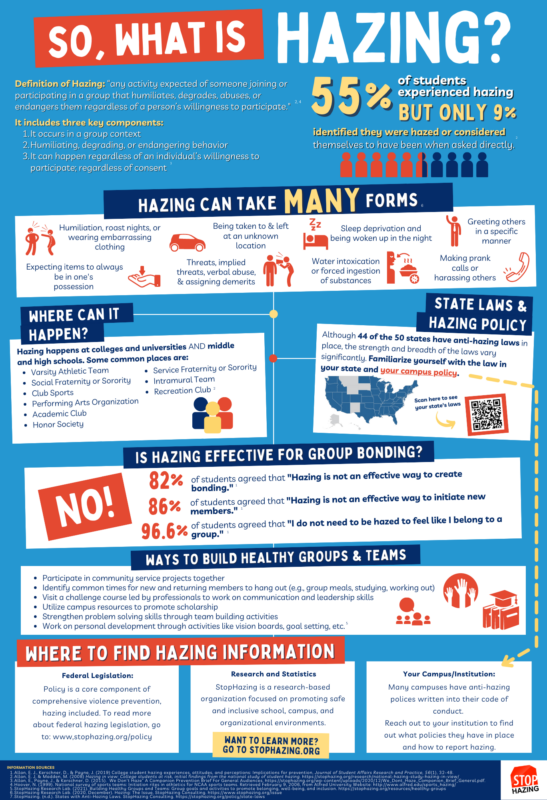Each year, ║┌┴¤│ď╣¤═°University Fraternity and Sorority Life hosts Anti-Hazing and Bystander Intervention programming for all organization members. We also participate in the national Hazing Prevention Week programming when each chapter works to raise awareness. It is an opportunity to educate the entire campus to not just recognize hazing, but to learn ways they can prevent it from occurring in the first place. All of our organizations are committed to a hazing-free atmosphere for their members.
Anti-Hazing Policy
║┌┴¤│ď╣¤═°University unconditionally opposes any action taken or situation created, intentionally or unintentionally, whether on or off premises owned or leased by the organization, which has the effect of producing psychological or physical discomfort, embarrassment, harassment, or ridicule. To read Shepherd’s entire anti-hazing policy, click .
Types of Hazing╠ř
There are three types of hazing. Regardless of type, no form of hazing is tolerated on our ╠řcampus.╠ř
- Subtle:╠řbehavior that emphasizes a╠řpower imbalance between╠řmembers. This type of hazing is most common and is often taken for╠řgranted or accepted as╠řharmless.╠řSubtle hazing typically involved attitudes or actions that breach reasonable standards of respect and place members of a group on the receiving end of ridicule,╠řembarrassment, and/or humiliation tactics, often endured to feel like part of the group. Some examples of subtle hazing may also be considered harassment hazing.╠ř
- Deception╠ř
- Assigning demerits╠ř
- Silence periods with implied threats for violation╠ř
- Deprivation of privileges granted to other members (apart from╠řvoting rights/ritualistic activities reserved for active members of fraternities or sororities)╠ř
- Requiring new members or people with a specific classification (i.e., only freshmen, only sophomores, etc.) to perform duties not assigned╠řto other╠řmembers╠ř
- Socially isolated members╠ř
- Line-ups, drills, and tests on meaningless information╠ř
- Name calling╠ř
- Expecting certain items to always be in oneÔÇÖs╠řpossession╠ř
- Harassment:╠řbehavior that╠řconfuses,╠řfrustrates, or causes a person╠řundue stress through╠řemotional╠řanguish and/or physical╠řdiscomfort╠řto feel part of a group.╠řSome types of harassment hazing can also be considered violent hazing.╠ř
- Verbal abuse╠ř
- Threats or implied threats╠ř
- Asking or requiring members to wear embarrassing or╠řhumiliation╠řattire╠ř
- Stunts or skits with degrading, crude, or╠řhumiliating╠řacts╠ř
- Expecting or requiring members to perform personal service to other members (e.g., carrying books, errands, cooking, cleaning)╠ř
- Sleep deprivation╠ř
- Sexual simulations╠ř
- Expecting members to be deprived of maintaining a normal schedule of bodily╠řcleanliness╠ř
- Being expected to harass or haze╠řothers╠ř
- Violent:╠řany╠řbehavior╠řwith potential╠řto cause╠řphysical, emotional,╠řand/or psychological╠řharm.╠řThis Is the most common type of hazing portrayed and reported in media.╠ř
- Forced or coerced alcohol,╠řdrug, or vile substance/concoction consumption╠ř
- Beating, paddling, or other forms of assault╠ř
- Branding or burning╠ř
- Water intoxication╠ř
- Expecting abuse or mistreatment of animals╠ř
- Public nudity╠ř
- Expecting illegal activity╠ř
- Bondage╠ř
- Abductions, kidnapping, or trafficking across state╠řlines╠ř
- Exposure to cold weather or extreme heat without appropriate protection
Step up and take the !
For more information visit the
The Hotline provides an anonymous telephone line for anyone to report a suspected or recent hazing incident to one number 1-888-NOT-HAZE (1-888-668-4293) that accepts calls 24 hours a day. The Hotline connects to a dedicated voice mailbox at Manley Burke, LPA. The calls are automatically saved as audio files that are then transmitted by e-mail to the headquarters of the fraternity or sorority named in the report. This is true whether or not the reports are about one of the sponsors or another organization. In some instances, reports are about athletic teams, bands or clubs. When those calls are received, the institution where the organization is located is contacted.
Anti-Hazing Laws for West Virginia, Maryland, and Virginia:


